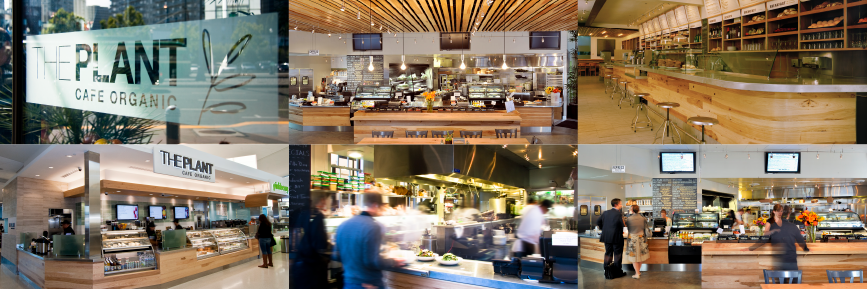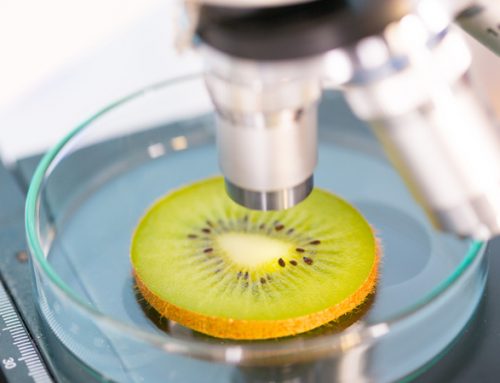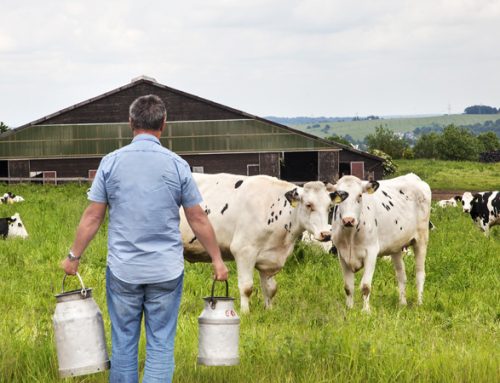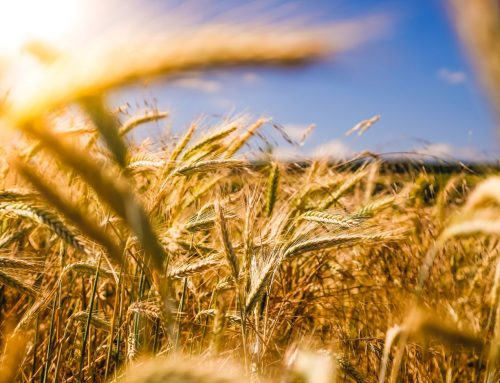What was your inspiration for The Plant? What is your mission?
Matthew: Around 2002 I went to a health retreat called Hippocrates Health Institute. The reason I went there was that a family member came down with cancer. He was a 40-year-old doctor and, sadly, he passed away pretty quickly. But it instigated me and my family to spend some time at this health retreat where we ate raw, organic food with no sugar.
After having had a pretty profound experience down there, I decided to come back, and I spoke to Mark Lewis, the Plant Café co-founder, who was working with me at the time. He was the chairman of the board at the software company I worked for – and the two of us set out on a path to provide clean food and clean ingredients.
The mission was to open up a restaurant that was purely, 100% organic, because it’s a slippery slope when you say “we’re sort of organic” and “we’re sort of not.” So we decided that every single thing would be 100% organic. And instead of telling people, “you should really eat healthy, you should eat this, or you should eat that,” we decided to just make it easy for people to eat that way.
“Instead of telling people, ‘you should really eat healthy, you should eat this, or you should eat that,’ we decided to just make it easy for people to eat that way”
The mission is clean, healthy food – so you know what’s not in your food – and providing an avenue for consumers to support conscious decisions. I think the most conscious decision we [make] is supporting purely local, 100% organic farms. [And] it’s kind of frightening, what might happen to you if you just blindly eat whatever you’re fed.
So we opened our first Plant, formerly known as “Lettus,” in the Marina. We changed the name to The Plant for copyright purposes – there was another company called “Lettus Entertain You” that wasn’t having it.
And we just sort of said, let’s see how this does. We had a very juice-heavy program, some cleanses, all organic food; we served no red meat, no mammals. Not even grass-fed, simply because we were trying to have a menu with a lower carbon footprint, and even grass fed lamb or grass fed beef, while it’s well raised and ethically raised, has still got a high carbon footprint. So we decided that everything we did (or, as much as we could), we’d try and support choices that were eco as well.
We opened the first one and the idea was always: if it does well we will open another. We never did this to just have a restaurant, we wanted it to proliferate 100% clean organic, no nonsense food.
We opened the first one at the end of 2005, in December. It was supposedly cursed because all the restaurants there had failed. But it was all we could get so we got it, and it did really well. Bit by bit, we watched our sales increase. We did ZERO marketing. And we sort of just bootstrapped the whole thing together and, after a couple years … we decided to open another one; and then a 3rd and then a 4th. We’ve been expanding as carefully and intelligently as we can but the idea is to get The Plant, or similar food offerings, out there to more people to affect healthy change and environment in people’s lifestyles and health care, etc.
Do you still follow the preservative free/sugar-free lifestyle that you encountered at the health retreat?
Matthew: No. I don’t eat any red meat – no mammals; no beef, pork, lamb – I haven’t for 25 years (since I was 15). Well… maybe not quite 25 years.
But I do try to eat 100% Organic; I would say that 95% or what I eat is 100% organic. And I do eat some sugar. If I were to take on any serious diet though, I would absolutely go on a vegan-raw-sugar-free diet.
In fact, somebody who worked with us had to take a leave of absence a few years ago, due to some sort of very serious, terminal cancer. We reconnected with him recently and, it turns out, he’s cancer free and feeling great. He’s shifted to a vegan and gluten-free diet and is even working for us again!
We’ve had an incredible number of customers and people who want to open franchises and such who have overcome [disease] through extreme diet change.
Tell us more about your personal background. Where did you come from and how did you end up where you are?
Matthew: EI grew up in Vancouver, Canada, which has really good health care. I mean, nobody will ever be wanting for anything; you’re always covered, no matter what. And then I moved to America and it’s not necessarily like that!
It was 2001 when I moved [to San Francisco] – a week before 911 hit, actually. But the company [I moved here to work for] ran out of money, like a lot of companies did – and I was really looking at my next phase. I had a lot of different ideas – a bunch of different technology company ideas that I thought about raising some money for, some different tech start-ups, but none of them seemed to be nearly as [important] as doing something like this.
We have so many customers that eat with us several days a week, or approach us and say “you know, we’re just so grateful that you provide this kind of clean food.” And that to me is a much more rewarding.
They appreciate what we’re doing and that’s why we’re doing it – and not just because they appreciate it but, also, because I think myself and Mark really truly believe that it’s very important to try and change the way people live and eat. And the best way to do that is just making it easy for [customers] to change and to switch. When you’re looking at what you want to do in life, obviously, creativity and passion are important, but if you feel really committed to why it is you’re doing what you’re doing, it’s not just a paycheck [anymore]. [Instead], you feel like you’re doing something – and that’s always a great feeling.
There have definitely been times over this past ten years where it’s been really tough and rough. The recession hit us right after we had signed our leases on our second and third restaurants. My beard went half gray! It was so stressful to wake up, morning after morning, with so much pressure and just [try] to make it work. But what kept me going, and Mark as well, [is that] I believe so strongly [in] what we were doing and that was enough to make it all worthwhile.
Also, the people we get to work with who have some similar ideas – you meet really wonderful people when you’re trying to do something good.
“You meet really wonderful people when you’re trying to do something good”
Do you feel like building your business in the San Francisco/Bay Area has altered your approach or affected your business in any way?
Matthew: I’m not sure it’s altered our approach – it’s been really great, considering the fact that there are a large number of organic local farms. [But] it’s a very, very, very difficult city to do business in and be profitable. [Many] restaurants and other businesses – small to medium sized – go under because the costs are just so ridiculously high. That’s been a true challenge and, while we’d like to expand more in San Francisco, I think we’re going to be heading to the South Bay and East Bay, and LA eventually because it’s very difficult to do business here.
What do you think the biggest challenge for your restaurant model is? I know cost is a huge component but do you think that is the biggest obstacle?
Matthew: I would say cost is a very large factor and it’s a big reason that restaurants [don’t] typically have very large margins. Unless you’re at either end of the spectrum: fast food tends to have a higher margin, due to cheaper ingredients; very high-end fine dining can have high margins because they’re charging a lot. But for everybody else, it’s not an easy business model – you’re looking at margins between 5-15% sometimes, so it’s very difficult to do business and be 100% organic.
What you’ll see are a lot of places that are using “organic” as a marketing ploy, with very little organic food on the actual menu. You’ll also see products that are emerging that are “hormone free” or “sustainably raised” but not necessarily 100% organic, and it becomes more and more difficult to really understand what these products are. What is in them? What’s not in them? And how good are they? Because, as the larger companies out there start to realize that there’s a market in healthy, clean food, they try and get in on it. Lobbyists are trying to change what organic means so that they can get in for cheaper.
Who else in the industry have you found to be particularly influential? Who has helped you shape your approach?
Matthew: I’ve got a lot of respect for Café Gratitude. They moved down to LA from San Francisco now but they are definitely in it.
This is not a restaurant company, but it’s one of my favorite companies out there: Patagonia – I just think what they’ve done is so cool! They started with their specific mission and they didn’t go public so they were able to have a certain profit margin and be okay with that. You don’t need to always increase your level of profit to be a worthwhile company. Sometimes there’s enough there that you can support your company and you can support your staff and consumers. And I respect that. A lot.
Alice waters, she’s pretty inspirational, I would say. Just with her approach to food, health, and education. And schools. So she’s a big one.
And then, you know, there’s this restaurant in Vancouver called “the Nom” – [it’s] a vegetarian place [and] they’ve always made really clean delicious, abundant food. Another place in Vancouver, [is] a grocery store and a small café called Eternal Abundance – it’s pretty earthy, but their food is just SO good, when you eat it you feel like you are doing something good for yourself. And it tastes good! So … Juicy Lucy, she’s one of the early juicers in San Francisco. There’s a few Juicy Lucy’s out in the world. Her name is Lisa [Bach], and I’ve been drinking her juices, on and off, for 15 years. That’s all that I can think of off the top of my head.
We’ve really enjoyed being involved in your process over the years. From your perspective, of all the certifications that you’ve looked out for, what attracted you to REAL certified?
Matthew: I met Lawrence (Founder of Eat REAL®) at a launch party held at an embassy in Pacific Heights somewhere. When I spoke with him, I got a real sense of how committed he is and that he is doing it for the right reasons.
And my philosophy is: the more organizations and people out there that have the same kind of motives and missions, the better. Together we can do something bigger.
“The more organizations and people out there that have the same kind of motives and missions, the better. Together we can do something bigger”
We’ve been approached by different certifications over the years, or “be in this healthy food guide” or “we’d like to certify you for this or that” but they all also cost a lot of money and we spend most of our money on being who we are – by trying to keep our 100% organic ingredients accessible and affordable.
I found that Eat REAL was willing to work on a slightly lower budget. And I just liked that. I felt like a lot of other green certifications were really more business and sales minded for their own growth, as opposed to doing it for reasons of promoting true health.
You launched your first café in 2005, so you’ve been doing this for a while now. Clearly, the industry has changed since kick off – what do you feel are the biggest transformations?
Matthew: I see that more awareness and education is making the industry larger and more sustainable. There’s just a lot more of it. And a lot more awareness on the consumer side.
When we started in 2005, juicing was a big component, but it wasn’t very common – the only other places that had juice programs were really earthy (and great) places like Café Gratitude. And now there are dozens of juice companies out there, which is good in one sense, but there are a lot of people jumping on the bandwagon and – I’m all for businesses trying to promote health but I also see that there are a lot of people riding the marketing wave of what they believe is a trend. Not all health, or environmentally, or sustainably-based businesses are created equal.
“Not all health, or environmentally, or sustainably-based businesses are created equal”
You see some come and some go. There’s a very large growth in the “fresh salad” and “sustainable/organic” market … more now than there was before – it’s more saturated – but there’s also a lot of greenwashing. We had a restaurant across the street from us at one of our locations that had “sustainable,” “organic,” “free range,” (all the catch words) all over their windows. But they went out of business because there wasn’t much that was truly was organic and sustainable on their menu. And I know because a lot of their former employees came to work for us.
I know that’s slightly negative, but, on the positive, there is more healthy food in general and consumers are more aware now. So it’s just a matter of figuring out the quality behind it.
I was reading up about you and your history before our conversation – about the fact that you really involve your chefs in your creative process.
Matthew: That’s really true. A lot of companies are run from a top-down only approach and I think you miss out when that’s the way you run a business because you have great minds on every level. And those people are in it; they’re experiencing what the customers are experiencing. Some of the best ideas come from different people in the company.
Collaboration is quite often a much stronger way to grow than one or two people deciding everything. Also, it builds unity and it builds a team – if people know that the company really cares about their contribution and that they can actually make a difference, it’s better for everybody. We’ve got some really amazing people working for us that are committed to making the world a better place and, when you get a lot of people together like that, there’s a lot to build from.
“Collaboration is quite often a much stronger way to grow than one or two people deciding everything”
Where do you see Plant café in 5 years? What’s the next step?
Matthew: In terms of a 5-year goal, our plans are to expand – first up and down the west coast. And then, from there, go national.
We’ve had quite a few inquiries over the past several years about franchises and decided not really to pursue the franchise model because it’s easy to lose control of your brand and your quality if you’re not careful, especially if there’s distance involved. We’ve been asked by people in India, Australia, Japan – all over the world! But we’ve decided just to try and grow it carefully, organically. But, our goal is to have as many Plants pop up as possible.
Some people ask us who our competition is and, you know, we have a lot of similar competition but there’s not really anybody that I know of [who is] quite as organic as we are – in terms of being 100%. Every ingredient. But there are a lot of brands emerging that are more health conscious. The way we see it is, they are somewhat competition but, there is more than enough room for everybody; the more businesses that do this, the better it is for everybody. It burgeons the industry and it helps small, organic farms, grow. So we want this to be as big as possible. Because we see it as a good thing for consumers.
“The more businesses that do this, the better it is for everybody. It burgeons the industry and it helps small, organic farms, grow. So we want this to be as big as possible. Because we see it as a good thing for consumers”
Is there anything I haven’t asked you about that you would like someone who’s reading this interview to know about The Plant?
Matthew: Well, we’ve done a little bit of work with schools and with some ex-cons trying to get job training. We’ve worked with a group in the Bay View to open a restaurant that would then train ex-cons and give them an opportunity to get a job outside of prison.
One path that we very much want to build upon in the future is getting clean, 100% organic food to more and more people. A Big Mac’s always going to be cheaper than a 100% organic sandwich with hormone free beef. So how do we figure out a way to bring this food to people who need it the most? People that have the least amount of health care, the least amount of options. So one thing, as we become more successful and larger, we’re looking to do something where we open small plants with limited menus that are partially subsidized so we can get really clean, safe, healthy food to the mainstream, regardless of their income levels.
Source: Eat Real






